UK Expresses Concerns Over Iran’s Persecution Of Baha'is
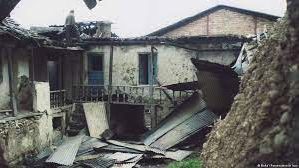
The UK has expressed deep concerns over the increasing arrests and persecution of followers of the Baha'i faith by the Islamic Republic as well as home demolitions and land seizures.

The UK has expressed deep concerns over the increasing arrests and persecution of followers of the Baha'i faith by the Islamic Republic as well as home demolitions and land seizures.
Britain's minister of state for South Asia and the Commonwealth at the Foreign Office, Tariq Ahmad, said on Friday “The UK is deeply concerned by increasing arrests of the Baha’i in Iran, including recent reports that the Iranian government has demolished houses and confiscated land in Roushankouh, [northern] Iran. Former spiritual leaders of the Baha’i in Iran are also reported to have been detained.
Condemning the increasing repression, he said that “the persecution of religious minorities cannot be tolerated in 2022. The persecution of religious minorities is a serious violation of international human rights law.”
“We are working closely with our international partners to hold Iran to account and continue to raise human rights concerns regularly with the Iranian Government,” Lord Ahmad of Wimbledon added.
On August 3, the US State Department’s Office of International Religious Freedom called on the Islamic Republic to stop its ongoing oppression, saying that “Amid a continued rise in arrests, sentences, and imprisonments, the US urges Iran to halt its ongoing oppression of the Baha'i community and honor its international obligations to respect the right of all Iranians to freedom of religion or belief.”
Iran’s security forces this week arrested several members of the Baha’i religious community regarded by the clerical government as heretics, and raided more than 20 households.
Security forces also laid siege to a village in northern Iran on August 2 and started demolishing houses and farms belonging to members of the persecuted Baha’i faith.
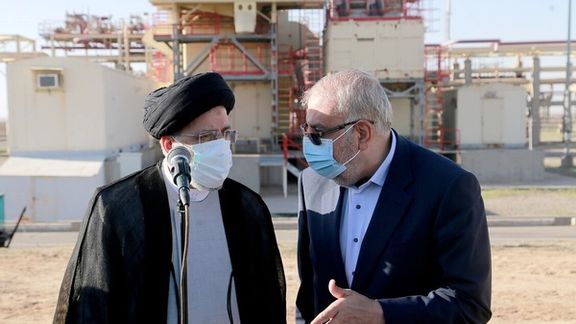
Iran once again Friday highlighted the importance of the country’s oil for global markets, as diplomats were meeting in Vienna to revive the 2015 nuclear deal.
The government’s official news website IRNA published an article Friday with the headline, “Iran’s bargaining power increased by boost to oil production,” claiming that the country can already produce 3.8 million barrels of oil per day.
The claim sounded hollow, as Iran’s oil minister Javad Owji announced in May that his ministry can boost oil production two months after a nuclear deal is reached, hopefully achieving 3.8 million barrels a day capacity.
In recent weeks, as Tehran has been trying to gain more concessions in nuclear talks with the United States, officials have increasingly dangled the prospect of helping Europe in the current energy crisis. They have argued that the only impediment is a lack of political will in Washington, meaning readiness to make concessions.
Even if Iran can produce 3.8 million barrels of crude p/d, its domestic consumption is around 1.7 million barrels, leaving roughly 2 million barrels for export. Currently Iran is shipping around 700-800 thousand barrels p/d, so its additional contribution to world markets would be a little over one million barrels per day.
This addition to world oil supplies can help, but Europe’s more acute need is for natural gas, in which Iran can hardly help despite holding the world’s second largest reserves. The reason is insufficient investments for decades that has led to a fall in production. If a nuclear deal materializes and major Western energy companies enter ventures in Iran to expand gas production, it could potentially export an undetermined quantity to Europe, most probably in liquified form.
But that can take years and can only materialize if a new nuclear agreement holds and no new complications emerge as a result of Iran’s actions in the volatile region.
IRNA’s claims of having achieved a larger production capacity and 40-percent higher revenues in energy exports is also related to Iran’s domestic politics. Economic conditions have seriously deteriorated since President Ebrahim Raisi took office exactly one year ago, and government claims of success in increasing export revenues are meant to take credit amid an avalanche of criticism.
The argument that Iran holds the trump card in the nuclear negotiations even reached the clerics. Tehran’s Friday Prayer Imam, Haj Ali Akbari said in his sermon that “when you need an agreement with us, accept Iran’s conditions and do not make too many demands.” He also warned the West “not to test Iran.”
But in fact, the West can say that economic pressure is on Iran as its annual inflation rate has reached 54 percent and prices for all essential food items have more than doubled in the past 12 months.
A table published by Etemad Online news website in Tehran on Saturday showed cooking oil became 367 percent more expensive since Raisi took office, while price of Rice climbed 200 percent and pasta 168 percent.
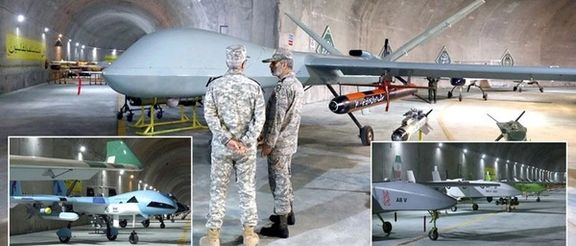
Amid reports that Iran is providing drones for Russian invasion of Ukraine, a senior US official has said the drones used by Tehran-backed militia groups across the Middle East are supplied by China.
United States Assistant Secretary of State for Near Eastern Affairs Barbara Leaf told members of the Senate Foreign Relations Committee on Thursday, August 4, that Beijing has been pushing sales of its military drones to Arab countries while doing nothing to stem the flow of other Chinese-made drones to militias backed by Iran in the region.
"It is an irony, I am the first to say, that those UAVs that these [Iranian] proxies use are Chinese… They are not provided by the state, but the state doesn't attempt to curtail that flow," apparently implying that Tehran gets the drones from China and distributes them to its proxy groups across the region.
She said that at the same time China sells its drones directly to the governments of the region. China has sold CH-4 drones to Saudi Arabia and Iraq, while the UAE has acquired the Wing Loong II, an armed unmanned aerial vehicle (UAV) equivalent to the American MQ-9 Reaper.
“The regime in Tehran is itself so supremely isolated and not just because of our sanctions — it’s isolated because of its own actions, its own predatory destructive behavior within [the country] as well as the larger region,” she noted.
Many countries, including Israel, accuse the Islamic Republic of providing its proxies with drones and other military equipment, saying Iranian-backed forces in Iraq, Syria, Yemen, and Hezbollah in Lebanon as well as the Venezuelan government receive UAVs and other weapons.
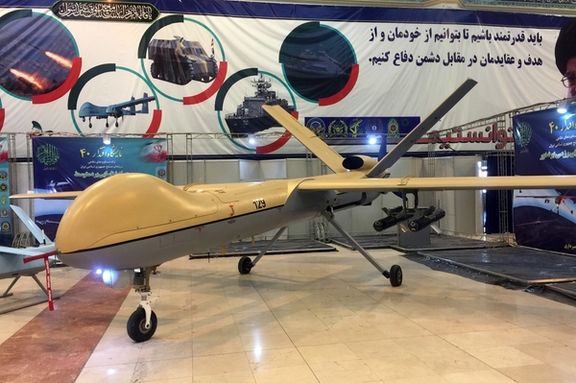
A report, not officially confirmed, says that Russia is using Iranian-provided military drones in its invasion of Ukraine.
US-based think tank Institute for the Study of War quoted advisor to the Ukrainian President’s Office, Oleksiy Arestovych, as saying on Friday that Iran handed 46 drones over to Russia and that the Ukrainian government has already noted the use of these drones in combat in Ukraine.
At least a portion of the provided drones are older-generation “Shahed 129” heavy strike drones, which Russian forces may seek to use to attack US-provided HIMARS (High Mobility Artillery Rocket System) in Ukraine, the institute said.
The news has not been confirmed by any high-ranking Ukrainian military or government official yet, with some people saying there is yet no concrete evidence of Russia using Iranian drones in Ukraine.
Some analysts say that if it is truly happening, it can be a major development in Russia-Iran relations, whose military-to-military cooperation has started worrying other countries.
US National Security Adviser Jake Sullivan warned twice in July that Moscow appears to be looking at buying Iranian drones and Russian officers even visited a drone base in Iran’s Kashan to review their options. His statements hinted at possible training of Russian crews to operate the drones and said that this would cause more civilian deaths in Ukraine.
Late In July, an Iranian lawmaker said the military cooperation between Tehran and Moscow has upset the political equations of the global order, confirming Russia’s request to buy Iranian drones.
An adviser to President Volodymyr Zelensky told Iran International on July 25 that Russia and Iran are allies in the Ukraine war and it won’t be a surprise if Tehran supplies drones to Moscow.
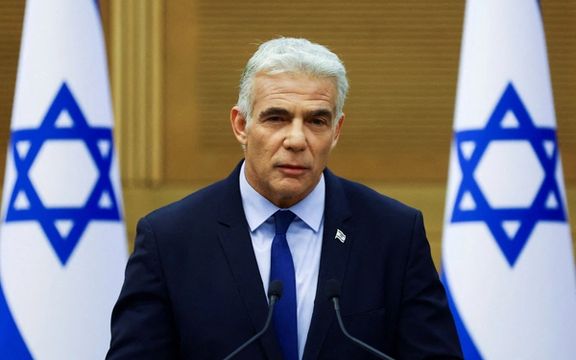
Israeli Prime Minister Yair Lapid said Friday that Islamic Jihad is an Iranian proxy that wants to destroy Israel, noting that Israel has a zero-tolerance policy for any attempted attacks from Gaza.
Referring to the Operation Breaking Dawn against targets in Gaza that started earlier on Friday, Lapid said that Israel will not sit idly by when there are those who are trying to harm its civilians and that the battle “will take as long as it takes.”
“Approximately four hours ago, the Israel Defense Forces — in cooperation with the Israel Security Agency — struck Islamic Jihad targets in Gaza. Among those killed were Taysir al-Jabari, one of the two most senior commanders in Islamic Jihad, as well as a cell preparing to launch an anti-tank missile attack against Israel,” he said.
“Israel carried out a precise counter-terror operation against an immediate threat. Our fight is not with the people of Gaza,” he said, adding that “Islamic Jihad is an Iranian proxy that wants to destroy the State of Israel and kill innocent Israelis. The head of Islamic Jihad is in Tehran as we speak.”
He was referring to the visit by Ziyad al-Nakhalah, the leader Islamic Jihad -- a militant outfit designated a terrorist organization by the US, EU, and UK.
During the week, Nakhalah held meeting with several senior Iranian officials in Tehran including Supreme Leader's adviser Ali Akbar Velayati, Foreign Minister Hossein Amir-Abdollahian, and Kamal Kharrazi, the head of Iran's Strategic Council on Foreign Relations, as well as President Ebrahim Raisi.
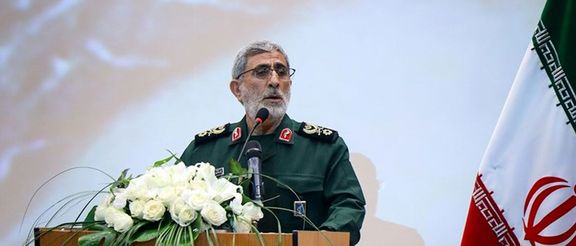
Iran will continue its struggle until the destruction of “enemies”, the United States and Israel, the commander of its extraterritorial Qods Force said Friday.
As a new flare up of violence between Israel and Iran-backed Islamic Jihad began Friday, Esmail Ghaani (Qaani) was speaking at a memorial service for three servicemen killed in the Syrian war.
Ghaani repeated a recent refrain heard from other Iranian officials that Israel is in decline and said that “Hezbollah’s sons are making plans to bring down the last blow against the Zionist regime…and to realize the wish of Imam Khomeini to eradicate Israel from the map and the face of the Earth.”
But he also threatened the United States: “The enemies of [Iran’s] Islamic government, led by America and the Zionist regime should know that we will never stop self-sacrifice and will move forward on the path of resistance."
The Islamic Republic uses the terms “resistance” to refer to its regional foreign and military policy of arming and supporting militant groups, such as the Islamic Jihad, the Lebanese Hezbollah, and the Houthi forces in Yemen primarily for attacking Israel but also threatening Arab states friendly to the West.
“The honorable path of martyrs will be pursued until the complete destruction of the enemies of the Islamic system,” he said, meaning Iran’s Islamic Republic.
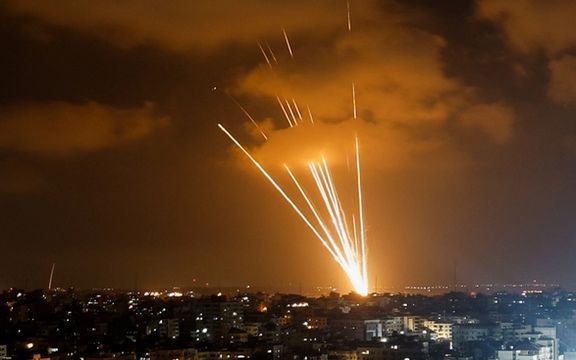
At the same time on Friday, the official Twitter account of the Revolutionary Guard (IRGC) wrote, “We clearly say that we interfere whenever there is the issue of opposing Israel. After this also, wherever any nation or group fights Israel, we stand behind them and support them.”
While Israel launched a series of air attacks throughout Gaza, killing about 10 members of Iran-backed Islamic Jihad including its military commander Taysir al-Jabari, the leader of the group was visiting Tehran.
During the week, Islamic Jihad’s leader Ziyad al-Nakhalah held meetings with several senior Iranian officials in Tehran including Supreme Leader's adviser Ali Akbar Velayati, Foreign Minister Hossein Amir-Abdollahian, and Kamal Kharrazi, the head of Iran's Strategic Council on Foreign Relations, as well as President Ebrahim Raisi.
Ghaani became commander of IRGC’s extra-territorial Qods (Quds) Force in January 2020, when its former notorious commander Qasem Soleimani was killed in a targeted US air strike in Baghdad. The Qods Force manages most of Iran’s military, intelligence and even political affairs in Iraq, Syria, Lebanon and Yemen.
The Qods commander did not mince words in his speech threatening the US and Israel. “These two traitor and murderous regimes will receive a response in the shortest time for each crime they commit,” and added, “The Islamic Republic makes plans to respond to all crimes that America and the usurper Zionist regime commit and will give its decisive answer at the appropriate time.”
Ghaani pledged to continue support for Hezbollah, saying, “the victors of this battle will undoubtedly be the sons of Islam.”
When Iranian officials use the word Islam, it often means Shiites, as Supreme Leader Ali Khamenei is portrayed as the leader of ‘Islam’. For Sunnis, however, who comprise the vast majority of Muslims, Khamenei is mostly seen as the leader of a sect that opposes their beliefs and traditions.